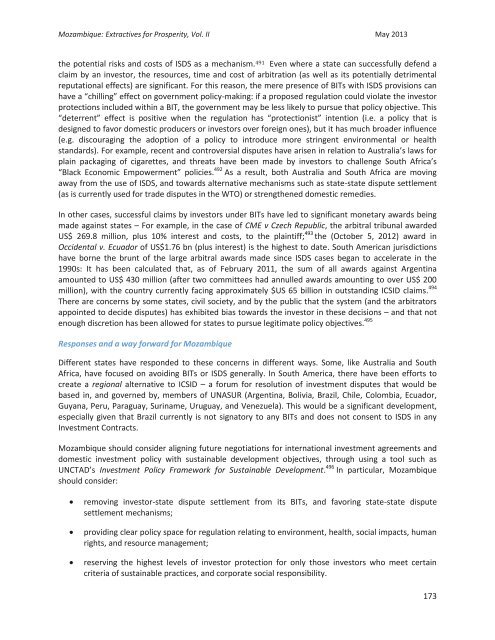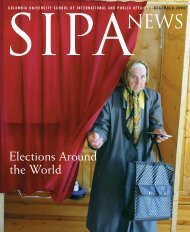Mozambique - School of International and Public Affairs - Columbia ...
Mozambique - School of International and Public Affairs - Columbia ...
Mozambique - School of International and Public Affairs - Columbia ...
Create successful ePaper yourself
Turn your PDF publications into a flip-book with our unique Google optimized e-Paper software.
<strong>Mozambique</strong>: Extractives for Prosperity, Vol. II May 2013<br />
the potential risks <strong>and</strong> costs <strong>of</strong> ISDS as a mechanism. 491 Even where a state can successfully defend a<br />
claim by an investor, the resources, time <strong>and</strong> cost <strong>of</strong> arbitration (as well as its potentially detrimental<br />
reputational effects) are significant. For this reason, the mere presence <strong>of</strong> BITs with ISDS provisions can<br />
have a “chilling” effect on government policy-making: if a proposed regulation could violate the investor<br />
protections included within a BIT, the government may be less likely to pursue that policy objective. This<br />
“deterrent” effect is positive when the regulation has “protectionist” intention (i.e. a policy that is<br />
designed to favor domestic producers or investors over foreign ones), but it has much broader influence<br />
(e.g. discouraging the adoption <strong>of</strong> a policy to introduce more stringent environmental or health<br />
st<strong>and</strong>ards). For example, recent <strong>and</strong> controversial disputes have arisen in relation to Australia’s laws for<br />
plain packaging <strong>of</strong> cigarettes, <strong>and</strong> threats have been made by investors to challenge South Africa’s<br />
“Black Economic Empowerment” policies. 492 As a result, both Australia <strong>and</strong> South Africa are moving<br />
away from the use <strong>of</strong> ISDS, <strong>and</strong> towards alternative mechanisms such as state-state dispute settlement<br />
(as is currently used for trade disputes in the WTO) or strengthened domestic remedies.<br />
In other cases, successful claims by investors under BITs have led to significant monetary awards being<br />
made against states – For example, in the case <strong>of</strong> CME v Czech Republic, the arbitral tribunal awarded<br />
US$ 269.8 million, plus 10% interest <strong>and</strong> costs, to the plaintiff; 493 the (October 5, 2012) award in<br />
Occidental v. Ecuador <strong>of</strong> US$1.76 bn (plus interest) is the highest to date. South American jurisdictions<br />
have borne the brunt <strong>of</strong> the large arbitral awards made since ISDS cases began to accelerate in the<br />
1990s: It has been calculated that, as <strong>of</strong> February 2011, the sum <strong>of</strong> all awards against Argentina<br />
amounted to US$ 430 million (after two committees had annulled awards amounting to over US$ 200<br />
million), with the country currently facing approximately $US 65 billion in outst<strong>and</strong>ing ICSID claims. 494<br />
There are concerns by some states, civil society, <strong>and</strong> by the public that the system (<strong>and</strong> the arbitrators<br />
appointed to decide disputes) has exhibited bias towards the investor in these decisions – <strong>and</strong> that not<br />
enough discretion has been allowed for states to pursue legitimate policy objectives. 495<br />
Responses <strong>and</strong> a way forward for <strong>Mozambique</strong><br />
Different states have responded to these concerns in different ways. Some, like Australia <strong>and</strong> South<br />
Africa, have focused on avoiding BITs or ISDS generally. In South America, there have been efforts to<br />
create a regional alternative to ICSID – a forum for resolution <strong>of</strong> investment disputes that would be<br />
based in, <strong>and</strong> governed by, members <strong>of</strong> UNASUR (Argentina, Bolivia, Brazil, Chile, Colombia, Ecuador,<br />
Guyana, Peru, Paraguay, Suriname, Uruguay, <strong>and</strong> Venezuela). This would be a significant development,<br />
especially given that Brazil currently is not signatory to any BITs <strong>and</strong> does not consent to ISDS in any<br />
Investment Contracts.<br />
<strong>Mozambique</strong> should consider aligning future negotiations for international investment agreements <strong>and</strong><br />
domestic investment policy with sustainable development objectives, through using a tool such as<br />
UNCTAD’s Investment Policy Framework for Sustainable Development. 496 In particular, <strong>Mozambique</strong><br />
should consider:<br />
<br />
<br />
<br />
removing investor-state dispute settlement from its BITs, <strong>and</strong> favoring state-state dispute<br />
settlement mechanisms;<br />
providing clear policy space for regulation relating to environment, health, social impacts, human<br />
rights, <strong>and</strong> resource management;<br />
reserving the highest levels <strong>of</strong> investor protection for only those investors who meet certain<br />
criteria <strong>of</strong> sustainable practices, <strong>and</strong> corporate social responsibility.<br />
173

















